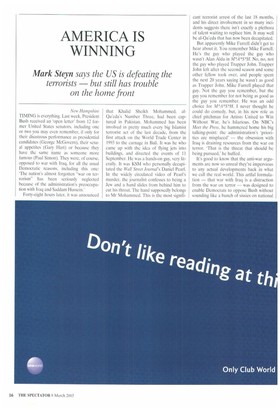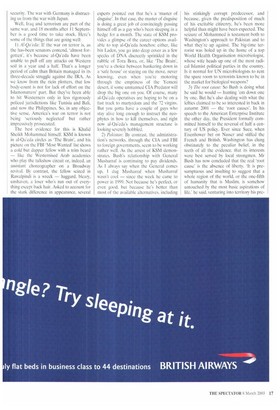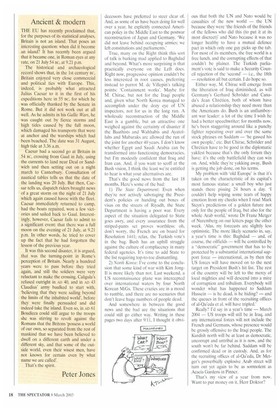AMERICA IS WINNING
Mark Steyn says the US is defeating the
terrorists — but still has trouble on the home front
New Hampshire TIMING is everything. Last week, President Bush received an 'open letter' from 12 former United States senators, including one or two you may even remember, if only for their disastrous performance as presidential candidates (George McGovern), their sexual appetites (Gary Hart) or because they have the same name as someone more famous (Paul Simon). They were, of course, opposed to war with Iraq, for all the usual Democratic reasons, including this one: 'The nation's almost forgotten "war on terrorism" has been seriously neglected because of the administration's preoccupation with Iraq and Saddam Hussein.'
Forty-eight hours later, it was announced
that Khalid Sheikh Mohammed, alQa'eda's Number Three, had been captured in Pakistan. Mohammed has been involved in pretty much every big Islamist terrorist act of the last decade, from the first attack on the World Trade Center in 1993 to the carnage in Bali. It was he who came up with the idea of flying jets into buildings, and directed the events of 11 September. He was a hands-on guy, very literally. It was KSM who personally decapitated the Wall Street Journal's Daniel Pearl. In the widely circulated video of Pearl's murder, the journalist confesses to being a Jew and a hand slides from behind him to cut his throat. The hand supposedly belongs to Mr Mohammed. This is the most signifi
cant terrorist arrest of the last 18 months, and his direct involvement in so many incidents suggests there isn't exactly a plethora of talent waiting to replace him. It may well be al-Qa'eda that has now been decapitated.
But apparently Mike Farrell didn't get to hear about it. You remember Mike Farrell. He's the guy who played the guy who wasn't Alan Aida in M*A*S*H. No, no, not the guy who played Trapper John. Trapper John left after the second season and some other fellow took over, and people spent the next 20 years saying he wasn't as good as Trapper John. Mike Farrell played that guy. Not the guy you remember, but the guy you remember for not being as good as the guy you remember. He was an odd choice for M*A*S*H. I never thought he could do comedy, but, in his new role as chief pitchman for Artists United to Win Without War, he's hilarious. On NBC's Meet the Press, he hammered home his big talking-point: the administration's 'priorities are misplaced' — the obsession with Iraq is draining resources from the war on terror. That is the threat that should be being pursued,' he huffed.
It's good to know that the anti-war arguments are now so unreal they're impervious to any actual developments back in what we call the real world. This artful formulation — that war with Iraq is a distraction from the war on terror — was designed to enable Democrats to oppose Bush without sounding like a bunch of sissies on national
security. The war with Germany is distracting us from the war with Japan.
Well, Iraq and terrorism are part of the same war, and LS months after 11 September is a good time to take stock. Here's some of the things that are going well: 1) Al-Qa'ecla: If the war on terror is, as the has-been senators contend, 'almost forgotten', it's because al-Qa'eda have been unable to pull off any attacks on Western soil in a year and a half. That's a longer period of calm than Britain managed in its three-decade struggle against the IRA. As we know from the ricin plotters, that low body-count is not for lack of effort on the Islamonutters' part. But they've been able to hit Westerners only in less rigorously policed jurisdictions like Tunisia and Bali, and now the Philippines. So, in any objective sense, America's war on terror is not being 'seriously neglected' hut rather impressively prosecuted.
The best evidence for this is Khalid Sheikh Mohammed himself. KSM is known in al-Qa.eda circles as 'The Brain', and his picture on the FBI 'Most Wanted' list shows a cold but dapper fellow with a trim beard — like the Westernised Arab academics who play the talkshow circuit or, indeed, an assistant choreographer on a Broadway revival. By contrast, the fellow seized in Rawalpindi is a wreck — haggard, bleary, unshaven, a loser who's run out of everything except back hair. Asked to account for the stark difference in appearance, several
experts pointed out that he's a 'master of disguise'. In that case, the master of disguise is doing a great job of convincingly passing himself off as a guy who's been sleeping in a hedge for a month. The state of KSM provides a glimpse of the career options available to top al-Qa*eda honchos: either, like bin Laden, you go into deep cover as a few specks of DNA discreetly sprinkled in the rubble of bra Bora, or, like 'The Brain', you've a choice between hunkering down in a 'safe house' or staying on the move, never knowing, even when you're motoring through the emptiness of the Yemeni desert, it some unmanned CIA Predator will drop the big one on you. Of course, many al-Qdeda operatives are hoping to be on a fast track to martyrdom and the 72 virgins. But you gotta have a couple of guys who stay alive long enough to instruct the neophytes in how to kill themselves, and right now al-Qa'eda's management structure is looking severely hobbled.
2) Pakistan: By contrast, the administration's networks, through the CIA and FBI to foreign governments, seem to be working rather well. As the arrest of KSM demonstrates. Bush's relationship with General Musharraf is continuing to pay dividends. As I always say when the General comes up, I dug Musharraf when Musharraf wasn't cool — since the week he came to power in 1999. Not because he's perfect, or even good, but because he's better than most of the available alternatives, including his stinkingly corrupt predecessor, and because, given the predisposition of much of his excitable citizenry, he's been more helpful than might have been expected. The seizure of Mohammed is testament both to Washington's approach to Pakistan and to what they're up against. The big-time terrorist was holed up in the home of a top World Health Organisation microbiologist, whose wife heads up one of the most radical Islamist political parties in the country. Is it normal for UN microbiologists to rent the spare room to terrorists known to be in the market for biological weapons?
3) The root cause: So Bush is doing what he said he would — hunting 'em down one by one. But he's also dealing with what the lefties claimed to be so interested in back in autumn 2001 — the 'root causes'. In his speech to the American Enterprise Institute the other day, the President formally committed himself to the reversal of half a century of US policy. Ever since Suez, when Eisenhower bet on Nasser and stiffed the French and British, Washington has clung obstinately to the peculiar belief, in the teeth of all the evidence, that its interests were best served by local strongmen. Mr Bush has now concluded that the real 'root cause' is the absence of liberty. 'It is presumptuous and insulting to suggest that a whole region of the world, or the one-fifth of humanity that is Muslim, is somehow untouched by the most basic aspirations of life,' he said, venturing into territory his pre decessors have preferred to steer clear of. And, as some of us have been doing for well over a year, he explicitly connected American policy in the Middle East to the postwar reconstruction of Japan and Germany. 'We did not leave behind occupying armies; we left constitutions and parliaments.'
True, many on the Right think this sort of talk is barking mad applied to Baghdad and beyond. What's more surprising is that practically everyone on the Left does. Right now, progressive opinion couldn't be less interested in root causes, preferring instead to parrot M. de Villepin's talking points: 'Containment works'. Maybe for M. Chirac, but not for the Iraqi people and, given what North Korea managed to accomplish under the dozy eye of UN inspectors, not for us in the long run. A wholesale reconstruction of the Middle East is a gamble, but an attractive one weighed against the certainty of disaster if the Baathists and Wahhabis and Ayatollahs and Mubaraks are allowed the run of the joint for another 40 years. I don't know whether Egypt and Saudi Arabia can be transformed into functioning democracies, but I'm modestly confident that Iraq and Iran can. And, if you want to scoff at the Bush vision, I think the least we're entitled to hear is what your alternatives are.
That's the good news from the last 18 months. Here's some of the bad: 1) The State Department: Even when they're not actively sabotaging the President's policies or handing out boxes of visas on the streets of Riyadh, the State Department is having a poor war. Every aspect of the situation delegated to State goes awry, and every assurance from the striped-pants set proves worthless: oh, don't worry, the French are on board for Resolution 1441; relax, the Turkish vote's in the bag. Bush has an uphill struggle against the culture of complacency in many federal agencies. It's time to add State to the list requiring top-to-toe dismantling.
2) North Korea: I've come to the conclusion that some kind of war with Kim JongII is more likely than not. Last weekend, a US reconnaissance plane was intercepted over international waters by four North Korean MiGs. These crazies are in a mood to rumble, and there are no scenarios that don't leave huge numbers of people dead.
And somewhere in between the good news and the had are the situations that could still go either way. Writing in these pages two days after 9/11, I thought it obvi
ous that both the UN and Nato would be casualties of the new world — the UN because they were 'the friends of the friends of the fellows who did this (to put it at its most discreet)' and Nato because it was no longer healthy to have a mutual defence pact in which only one guy picks up the tab. For most of its members, the free world is a free lunch, and the corrupting effects of that couldn't be plainer. The Turkish parliament's vote is said to make a Security Council rejection of the 'second' — i.e., the 18th — resolution all but certain. I do hope so.
Either way, M. Chirac will emerge from the liberation of Iraq diminished, as will Germany's Gerhard Schroder and Canada's Jean Chretien, both of whom have abused a relationship they need more than the Americans do. Bush is an unflamboyant war leader: a lot of the time I wish he had a better speechwriter; for months now, he's been staggering around like a punchy fighter repeating over and over the same stock phrases on Saddam — 'he gassed his own people,' etc. But Chirac, Schroder and Chretien have to be good in the diplomatic yakfest because that's the only forum they have: it's the only battlefield they can win on. And, while they're yakking away, Bush is getting the job done, on his terms.
My problem with 'old Europe' is that it's taken on the characteristic of its capital's most famous statue: a small boy who just stands there pissing 24 hours a day. 'I couldn't help wiping some tears of happy emotion from my cheeks when I read Mark Steyn's predictions of a golden future not only for the people of Iraq, but also for the whole Arab world,' wrote Dr Franz Metger of Nuremberg on our letters page the other week, 'Alas, my forecasts are slightly less optimistic. The more likely scenario in, say, a year's time is this: Baghdad — and, of course, the oilfields — will be controlled by a "democratic" government that has to be protected by a substantial international support force — international, as by then the US forces will have moved on to the next target on President Bush's hit list. The rest of the country will be left to the mercy of local mighties and will descend into a mire of corruption and tribalism. Everybody will wonder what has happened to Saddam Hussein — is he dead, is he hiding? — and the queues in front of the recruiting offices of al-Qa'eda et al, will have tripled.'
Really? I'd say in a year's time — March 2004 — US troops will still be in Iraq, and any international forces will not include the French and Germans, whose presence would be grossly offensive to the Iraqi people. The Kurdish north will be at least as democratic, uncorrupt and untribal as it is now, and the south won't be far behind. Saddam will be confirmed dead or in custody. And, as for the recruiting offices of al-Qa'eda, Dr Metger's proverbially explosive Arab street will turn out yet again to be as somnolent as Acacia Gardens in Pinner.
That's my view of a year from now. Want to put money on it, Herr Doktor?




































































 Previous page
Previous page